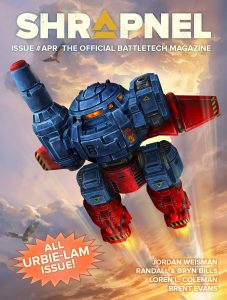Difference between revisions of "Headhunter Missile"
m (Text replacement - "Pegasus (Combat Vehicle - Hovertank)" to "Pegasus") |
|||
| (14 intermediate revisions by 7 users not shown) | |||
| Line 1: | Line 1: | ||
| − | Among the [[Star League]]'s most famous military [[lostech]] devices, the '''Headhunter Missile''', or HHM, was a missile developed specifically for achieving "head shots" against opponents. Purportedly, it was a special ammunition for [[Long-Range Missile Launcher]]s | + | Among the [[Star League]]'s most famous military [[lostech]] devices, the '''Headhunter Missile''', or HHM, was a missile developed specifically for achieving "head shots" against opponents. Purportedly, it was a special ammunition for [[Long-Range Missile Launcher]]s and [[Short-Range Missile Launcher]]s of all sizes.<ref name="ER:2750p28">''Era Report: 2750'', p. 28: "Headhunter Missile"</ref> |
== Description == | == Description == | ||
| − | One of the more mysterious advances reportedly emerging from [[First Lord]] [[Jonathan Cameron]]'s paranoia-fueled military renaissance initiated in the final decade of the [[ | + | One of the more mysterious advances reportedly emerging from [[First Lord]] [[Jonathan Cameron]]'s paranoia-fueled military renaissance initiated in the final decade of the [[twenty-seventh century]], at least when compared to the [[Caspar]] drones, the Headhunter Missiles were reportedly the ultimate [[MechWarrior (pilot)|MechWarrior]]-killer weapon, developed alongside the prototype [[Snub-Nose PPC]] for the [[Star League Defense Force]]'s [[Royal Command]]s.<ref name=TSL-61>''The Star League'', p. 61: "History - Peace and Prosperity - Military Renaissance"</ref> |
Beyond anecdotal evidence, much of which seems to wildly exaggerate the weapon's capability, authenticated [[BattleROM]] recording of a firing range test show an unknown [[Star League era]] missile system scoring a high rate of head shots against a variety of targets. However, this system was only observed to fire single missiles<ref name="ER:2750p28"/> (as opposed to the usual volleys from LRM or SRM launchers). | Beyond anecdotal evidence, much of which seems to wildly exaggerate the weapon's capability, authenticated [[BattleROM]] recording of a firing range test show an unknown [[Star League era]] missile system scoring a high rate of head shots against a variety of targets. However, this system was only observed to fire single missiles<ref name="ER:2750p28"/> (as opposed to the usual volleys from LRM or SRM launchers). | ||
| − | Exactly how the Headhunter Missile system worked is unknown, with many different theories proposed and rejected. Active homing guidance would have suffered from [[ECM]] jamming while teleoperation would be subject to time-to-target limitations. The most plausible explanation seems to be that the system used a type of [[w:Beam riding|beam riding]] method which combined aspects of an advanced [[Targeting Computer]] with [[Streak]] fire control systems. However, the two technologies are considered largely incompatible in the [[ | + | Exactly how the Headhunter Missile system worked is unknown, with many different theories proposed and rejected. Active homing guidance would have suffered from [[ECM]] jamming while teleoperation would be subject to time-to-target limitations. The most plausible explanation seems to be that the system used a type of [[w:Beam riding|beam riding]] method which combined aspects of an advanced [[Targeting Computer]] with [[Streak]] fire control systems. However, the two technologies are considered largely incompatible in the [[thirty-first century]], and it is unknown how the Star League would have overcome this obstacle. It is also assumed the missile had [[Tandem-Charge Warhead]]s.<ref name="ER:2750p28"/> |
| − | == | + | ==Models== |
| − | In [[3028]], just before the | + | In [[3028]], just before the outbreak of the [[Fourth Succession War]], a small detachment of [[Hansen's Roughriders]] was sent with a dig team to recover the contents of [[SLD 601]], a forgotten [[SLDF]] depot on [[Rosetta]], a moon in the [[Periphery]]. The depot was found to contain thousands of intact '''HHM Starfire Mark 2500''' missiles in crates marked M-2500: "the lost Holy Grail of military technology" which the commander felt would "change the course of modern warfare." However, in the face of armed resistance from local forces with [[Pegasus (Combat Vehicle - Hovertank)|Pegasus]] hovertanks they eventually had to retreat empty-handed when a local environmental phenomenon flooded the dig site with liquid sulfur. In the aftermath, they wondered if the locals had maybe used Headhunter Missiles, as one Roughrider [['Mech]] had suffered an exceptionally lucky hit to its cockpit from a missile salvo during the fight.<ref>''Starfire'' (in: ''BattleTech: 25 Years of Art & Fiction'', pp. 47–57)</ref> |
== References == | == References == | ||
| Line 16: | Line 16: | ||
== Bibliography == | == Bibliography == | ||
* ''[[Era Report: 2750]]'' | * ''[[Era Report: 2750]]'' | ||
| − | |||
* ''[[The Star League]]'' | * ''[[The Star League]]'' | ||
| + | * ''[[Starfire (short story)|Starfire]]'' (in: ''[[BattleTech: 25 Years of Art & Fiction]]'') | ||
| + | |||
[[Category: Technology|Headhunter Missile]] | [[Category: Technology|Headhunter Missile]] | ||
[[Category: Missile Weapons|Headhunter Missile]] | [[Category: Missile Weapons|Headhunter Missile]] | ||
Latest revision as of 09:57, 27 September 2023
Among the Star League's most famous military lostech devices, the Headhunter Missile, or HHM, was a missile developed specifically for achieving "head shots" against opponents. Purportedly, it was a special ammunition for Long-Range Missile Launchers and Short-Range Missile Launchers of all sizes.[1]
Contents
Description[edit]
One of the more mysterious advances reportedly emerging from First Lord Jonathan Cameron's paranoia-fueled military renaissance initiated in the final decade of the twenty-seventh century, at least when compared to the Caspar drones, the Headhunter Missiles were reportedly the ultimate MechWarrior-killer weapon, developed alongside the prototype Snub-Nose PPC for the Star League Defense Force's Royal Commands.[2]
Beyond anecdotal evidence, much of which seems to wildly exaggerate the weapon's capability, authenticated BattleROM recording of a firing range test show an unknown Star League era missile system scoring a high rate of head shots against a variety of targets. However, this system was only observed to fire single missiles[1] (as opposed to the usual volleys from LRM or SRM launchers).
Exactly how the Headhunter Missile system worked is unknown, with many different theories proposed and rejected. Active homing guidance would have suffered from ECM jamming while teleoperation would be subject to time-to-target limitations. The most plausible explanation seems to be that the system used a type of beam riding method which combined aspects of an advanced Targeting Computer with Streak fire control systems. However, the two technologies are considered largely incompatible in the thirty-first century, and it is unknown how the Star League would have overcome this obstacle. It is also assumed the missile had Tandem-Charge Warheads.[1]
Models[edit]
In 3028, just before the outbreak of the Fourth Succession War, a small detachment of Hansen's Roughriders was sent with a dig team to recover the contents of SLD 601, a forgotten SLDF depot on Rosetta, a moon in the Periphery. The depot was found to contain thousands of intact HHM Starfire Mark 2500 missiles in crates marked M-2500: "the lost Holy Grail of military technology" which the commander felt would "change the course of modern warfare." However, in the face of armed resistance from local forces with Pegasus hovertanks they eventually had to retreat empty-handed when a local environmental phenomenon flooded the dig site with liquid sulfur. In the aftermath, they wondered if the locals had maybe used Headhunter Missiles, as one Roughrider 'Mech had suffered an exceptionally lucky hit to its cockpit from a missile salvo during the fight.[3]


